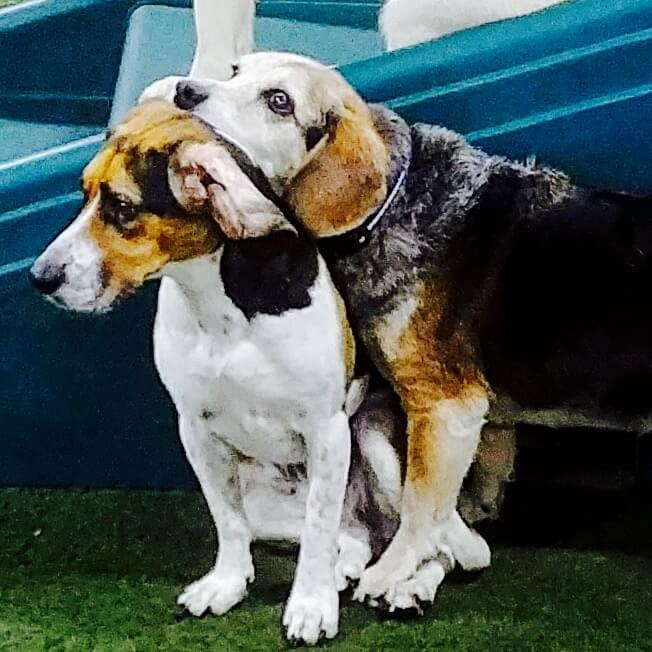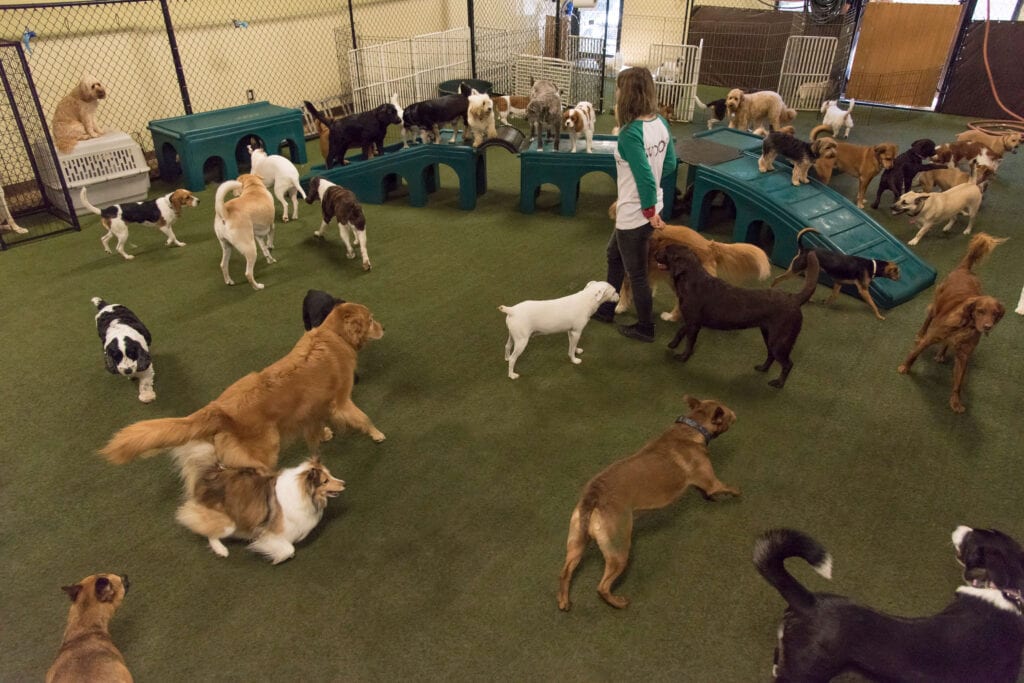What you need to know about Canine Cognitive Dysfunction in senior dogs
Is your senior dog starting to show signs of cognitive dysfunction? Signs of cognitive dysfunction can be easy to brush off as general aging, but it’s important to recognize them so you can intervene and make a difference in your dog’s quality of life.
Canine Cognitive Dysfunction (CCD) is also known as Canine Cognitive Syndrome (CDS) or, more casually, doggy dementia. It is a condition related to changes in a dog’s brain, much like Alzheimer’s disease or dementia in humans. It’s estimated that 40% of dogs over 12 develop CDD.
Changes in the aging canine brain
As dogs age, their brain volume decreases, just as it does in humans. The aging brain has fewer neurons and more free-radicals than the brain of a younger one.
The frontal cortex decreases in size. This is the brain area that is responsible for memory, emotions, impulse control, problem-solving, social interaction, and motor function. As the frontal cortex gets smaller, the ventricular volume gets larger.
There can be an increase in beta-amyloids, which are abnormally configured proteins thought to play a key role in Alzheimer’s in humans. Beta-amyloids are sticky in nature and can clump together and block cellular signaling and synapses.
The loss of healthy brain tissue and cell death, and plaques and neurofibrillary tangles is thought to cause dementia.
Dementia is not normal aging. It’s caused by damage to brain cells and their ability to communicate with each other.
Signs of CDD
Canine Cognitive Dysfunction is often diagnosed using the DISHAA checklist.
- Disorientation Acting confused, staring into space, spinning in circles, getting stuck in a corner or under furniture.
- Interaction Less desire for being around other people and/or pets. Or, on the flip side, becoming clingy when that was not previous behavior.
- Sleep-Wake Cycle More sleep during the day and staying awake at night. Vocalizing or howling at night for no apparent reason.
- House soiling Forgetting previously learned behaviors, including where to potty or how to ask to go outside.
- Activity Less activity and less interest in things.
- Anxiety Wandering the house at night, pacing, and excessive panting. Difficulty dealing with change.
Behavior changes could be signs of an underlying health disorder
It’s important to talk to your veterinarian if you notice signs of cognitive decline in your dog. Senior dogs often experience impaired vision and hearing, leading to some confusion and being less responsive. Kidney disease or Cushing’s could lead to house soiling. Your veterinarian will evaluate your pet’s bloodwork and urinalysis to determine the cause of the changes in behavior.
Factors that contribute to CDD include:
- Deficiency of DHA
- Low B6, B12, and folic acid
- Chronic oxidative stress (free-radicals)
- High blood pressure
- Anything that reduces oxygen supply to the brain
Treatment for CDD include:
- Improving brain metabolism
- Reducing oxidative damage
- Enhancing neuronal transmission and maintain neuronal integrity
- Getting oxygen to the brain
Supplements for Canine Cognitive Dysfunction
- Omega 3 Polyunsaturated Fatty Acids (PUFA’s) DHA, DPA
- Phosphatidylserine (PS) Stimulates neuronic survival and synapses, releases dopamine (found naturally in red meat and brain)
- SAMe
- Ginkgo Biloba
- Mitochondrial Cofactors (L carnitine, alpha-lipoic acid)
- B Vitamins for brain development and function and is neuroprotective.
- Medium Chain Triglycerides (MCT)
- Lion’s Mane Mushroom Enhances brain function, hericenones, and erinacines.
- Choline speeds up brain signaling, found naturally in egg yolks.
- CBD Can help reduce anxiety in dogs with CDD
- Anti-oxidants
- Vitamin E Improves cholinergic transmission and is neuroprotective.
- Vitamin C
- Beta carotene
- Flavonoids
- CoQ10
- Selenium
- Arginine
Supplement blends for CDD
- Aktivait Contains PS, Omega 3 fatty acids, and antioxidants (in a 42-day trial, signs of improvement were significant)
- Senilife Contains PS, Ginko Biloba, and antioxidants (in two studies, dogs showed signs of improvement)
- Cholodin Contains choline, PS, amino acids, vitamins, and minerals.
- Brain Food Freeze-dried New Zealand calf brain blueberries and Lion’s Mane mushrooms
Prescription drugs for CDD
- Anipryl (selegiline) This is the only drug that has been approved for the treatment of CDD. It works by reducing anxiety and increasing alertness in dogs.
- Fluoxetine (Prozac) Can help with anxiety
- Trazodone An antidepressant to treat behavior disorders due to anxiety and phobias.
A promising drug for the future
Gedacure is a new drug with the active ingredient Crisdesalazine by GNT Pharma in Korea. It is undergoing clinical trials conducted for dogs with CCD. This is a multi-target drug to prevent both inflammation and free radicals that contribute to nerve cell death, amyloid plaque production, and neurofibrillary tangle formation.
Preventing CDD
Feed a nutritionally balanced, unprocessed, or lightly processed diet. Include plenty of fresh fruits and vegetables, especially those high in antioxidants and beta carotene.
Supplementing your dogs’ diet with Omega 3 fatty acids is very important. If you feed kibble, don’t buy the bag that includes Omega 3’s because the chances of the oil not oxidizing and going rancid are very slim. Instead, buy a fish oil supplement in capsules or a glass bottle that you refrigerate. Avoid plastic bottles and pumps that allow air to get in.
Provide daily exercise with some amount of aerobic activity, so oxygen is getting to the brain. Don’t overdo it, but if your dog is healthy enough for a small amount of running or chasing a ball, it can make a big difference.
Make sure your dog is getting mental stimulation. This can include plenty of time to sniff to his delight, foraging for treats hidden in the house or a snuffle mat, or doing puzzles. Find a new route on your daily walk with some new smells. Remember, dogs’ primary sense is their olfactory system.
Also, allow your dog his own agency. That is the ability to make a few choices of his own. Allowing your dog to think and figure things out is very important for his mental stimulation. It can be as simple as letting him choose which way you turn on a walk or letting him choose which treat he wants. Using the brain keeps it healthy.
Living with a dog with CDD
Patience is key for a healthy, happy relationship. Remember that dogs with CDD have a challenging time with change, so if possible, don’t move houses or rearrange the furniture.
Please keep your dog safe by blocking stairs or other things where he could get hurt. Go through your house as if you had a baby you were trying to protect from injury and move things out of harm’s way.
This is not the time to introduce a new dog to the family, which could cause more confusion and anxiety.
Let your dog enjoy the things he can enjoy. Allowing plenty of time to sniff on walks will stimulate your dog’s brain and help reduce anxiety and stress.
Meals can provide a lot of enjoyment, especially for a dog that does not have many other pleasures. He may need help eating, and it could come down to needing to feed pureed food from a syringe. But do what you can to provide as much pleasure and stimulation as possible with meals. This is also a nice bonding time for you. Home-made chicken stew can be a wonderful and nutritious treat.
The book, Remember Me? Loving and Caring for A Dog with Canine Cognitive Dysfunction by Eileen Anderson has a lot of beneficial information for both you and your dog.
We cannot reverse severe cognitive decline, but significantly slowing the progression is possible with early detection and intervention.






